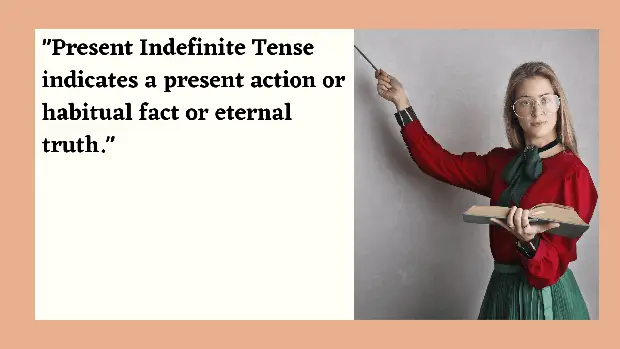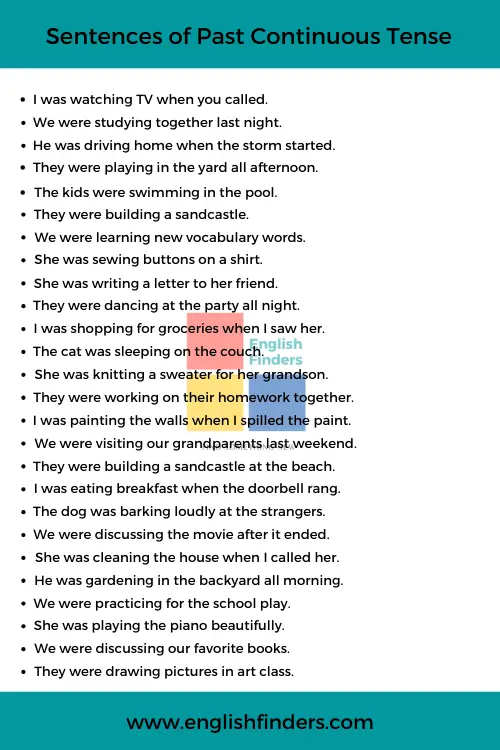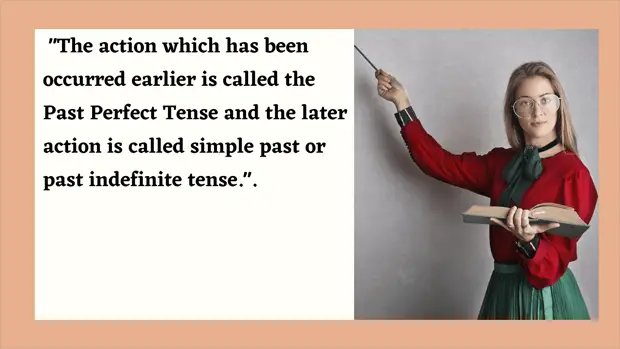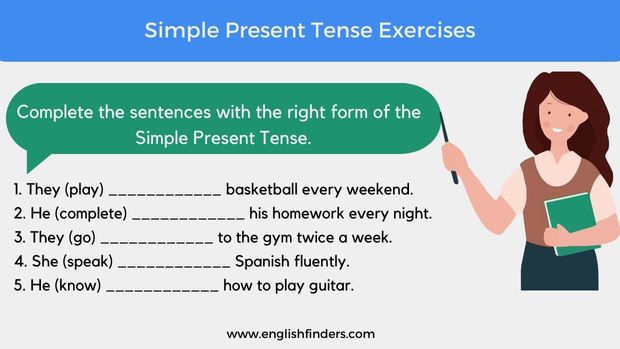Last updated on March 11th, 2025 at 10:53 am
What is Present Indefinite Tense?
Quick Navigation
We need to use the Present Indefinite Tense to indicate a present action, habitual fact, or eternal truth. If a sentence starts with the third-person singular number, then ‘s’ or ‘es’ are added to the main verb’s end. Let us see some examples of Present Indefinite Tense:
- Hasaan starts a new game.
- This young girl looks pretty beautiful.
- I make a decision in my life.
- He recites a verse from the holy scripture.
- We are united now and forever.
Key Uses of Present Indefinite Tense
✅ General Truths & Facts: Things that are always true.
➡️ The Earth revolves around the Sun.
➡️ Water boils at 100°C.
✅ Daily Habits & Routines: Actions that happen regularly.
➡️ I go to school every morning.
➡️ She drinks coffee in the evening.
✅ Fixed Schedules & Timetables: Events that follow a set timetable.
➡️ The bus arrives at 8 AM.
➡️ The store opens at 10 AM.
✅ Instructions & Directions: Giving simple commands or guidance.
➡️ You mix flour and sugar first.
➡️ Turn left at the traffic light.
Structure of Present Indefinite Tense
To use the Present Indefinite Tense correctly, you need to understand its sentence structure. This tense follows a simple pattern and is mostly formed using the base form (V1) of the verb. However, for third-person singular subjects (he, she, it, or any singular noun), we add “s” or “es” to the verb.
Let’s break it down into three types of sentences:
1. Affirmative Sentences (Positive Statements)
✅ Structure:
Subject + Verb (V1) + Object
✅ Examples:
➡️ I play football every evening.
➡️ She reads a book before bed.
➡️ The train arrives at 9 AM.
Note: For he, she, it, or singular nouns, we add “s” or “es” to the verb.
- He eats lunch at 2 PM.
- She teaches English.
2. Negative Sentences (To say something does not happen)
✅ Structure:
Subject + Do/Does + Not + Verb (V1) + Object
✅ Examples:
➡️ I do not like spicy food.
➡️ She does not watch TV at night.
➡️ They do not play cricket on Sundays.
Note:
- Use “do not” (don’t) with I, we, you, they.
- Use “does not” (doesn’t) with he, she, it (no “s” on the main verb).
3. Interrogative Sentences (Questions)
✅ Structure:
Do/Does + Subject + Verb (V1) + Object + ?
✅ Examples:
➡️ Do you like ice cream?
➡️ Does she go to school by bus?
➡️ Do they live in New York?
Note:
- Use “Do” with I, we, you, they.
- Use “Does” with he, she, it (no “s” on the main verb).
Let us see the different forms of Present Indefinite Tense:
| Affirmative | Interrogative | Negative | Negative Interrogative |
| Jeba takes a new step. | Does Jeba take a new step? | Jeba does not take a new step. | Does Jeba not take a new step? |
| He celebrates his marriage anniversary. | Does he celebrate his marriage anniversary? | He does not celebrate his marriage anniversary. | Does he not celebrate his marriage anniversary? |
| We laugh to hear this joke. | Do we laugh to hear this joke? | We do not laugh to hear this joke. | Do we not laugh to hear the joke? |
| I see a beautiful scenario. | Do I see a beautiful scenario? | I do not see a beautiful scenario. | Do I not see a beautiful scenario? |
| Liza cooks good food. | Does Liza cook good food? | Liza does not cook good food. | Does Liza not cook good food? |
Examples of Present Indefinite Tense
Now, let’s walk you through some real-life examples of Present Indefinite Tense:
- I listen to good music.
- He seeks a new job.
- We read attentively.
- They want to ride a bike.
- Jacky thinks she can do it.
- Do they follow the law?
- Does he not make money?
- Kajal publishes a unique journal.
- I do not sell the apartment.
- The president sends a message to all.
- He obeys his responsibility.
- She participates in a debate.
- I do not know him.
- Jamal gets the trophy.
- She does not know how to swim.
- The bird flies in the sky.
- The sun rises early in the morning.
- My teacher teaches me English.
- I want to be a good writer.
- They do not play the game well.
Summary
The Present Indefinite Tense is one of the most important and frequently used tenses in English. It helps us talk about habits, routines, general truths, fixed schedules, and instructions. Understanding its structure—affirmative, negative, and interrogative sentences—makes it easier to use correctly in daily conversations and writing.
To summarize:
✅ Use it for facts and universal truths (The Earth revolves around the sun).
✅ Use it for daily habits and routines (I drink coffee every morning).
✅ Use it for fixed schedules (The train departs at 6 PM).
✅ Use it for instructions and directions (Mix the ingredients well).
Just practice with real-life examples, and you can learn the Present Indefinite Tense and improve your English communication skills. Keep practicing, and soon, using this tense will become second nature to you!
Do you have any questions? Drop them in the comments, and let’s keep learning together! 😊
Excercises on Present Indefinite Tense
Here are some exercises to help you practice and master the Present Indefinite Tense.
Exercise 1: Fill in the Blanks
Complete the sentences using the correct form of the verb in brackets.
- She ______ (wake) up at 6 AM every day.
- My father ______ (work) in a bank.
- They ______ (not/watch) TV in the morning.
- ______ you ______ (like) ice cream?
- The train ______ (leave) at 7 PM.
- He ______ (not/play) football on Sundays.
- ______ she ______ (go) to school by bus?
- Water ______ (boil) at 100°C.
- I ______ (visit) my grandparents every weekend.
- Our teacher ______ (give) us homework daily.
Exercise 2: Correct the Mistakes
Some of these sentences have mistakes. Rewrite them correctly.
- He go to the gym every day.
- She do not like spicy food.
- The dog bark at night.
- Do she play the guitar?
- They doesn’t speak English fluently.
Exercise 3: Make Sentences
Write one sentence for each type using the verb “write”:
- Affirmative (He/she/it…)
- Negative (He/she/it…)
- Interrogative (He/she/it…?)
Exercise 4: Choose the Correct Option
Select the correct verb form in each sentence.
- The sun (rise/rises) in the east.
- My friends (love/loves) playing football.
- He (study/studies) hard for exams.
- We (watch/watches) movies every weekend.
- She (does/do) not like cold weather.
Exercise 5: Change the Sentences
Rewrite these sentences in the negative and interrogative forms.
- They play cricket every evening.
- She eats breakfast at 8 AM.
- The baby cries a lot.
- I visit my uncle every summer.
- He teaches English in a school.
Answers (For Self-Checking)
1. Fill in the Blanks:
- wakes
- works
- do not watch
- Do, like
- leaves
- does not play
- Does, go
- boils
- visit
- gives
2. Correct the Mistakes:
- He goes to the gym every day.
- She does not like spicy food.
- The dog barks at night.
- Does she play the guitar?
- They don’t speak English fluently.
3. Make Sentences
Affirmative:
- He writes a diary every night.
Negative:
- She does not write emails on weekends.
Interrogative:
- Does it write automatically?
4. Choose the Correct Option:
- rises
- love
- studies
- watch
- does
5. Change the Sentences:
They play cricket every evening.
- Negative: They do not play cricket every evening.
- Interrogative: Do they play cricket every evening?
She eats breakfast at 8 AM.
- Negative: She does not eat breakfast at 8 AM.
- Interrogative: Does she eat breakfast at 8 AM?
The baby cries a lot.
- Negative: The baby does not cry a lot.
- Interrogative: Does the baby cry a lot?
I visit my uncle every summer.
- Negative: I do not visit my uncle every summer.
- Interrogative: Do I visit my uncle every summer?
He teaches English in a school.
- Negative: He does not teach English in a school.
- Interrogative: Does he teach English in a school?

Azizul Hakim is the founder & CEO of englishfinders.com. He is a passionate writer, English instructor, and content creator. He has completed his graduation and post-graduation in English language and literature.




